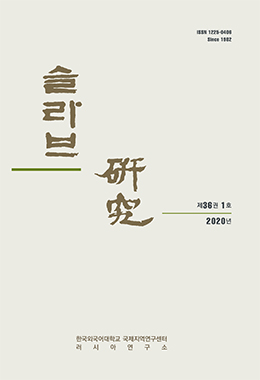본 연구는 개인적인 회개와 세례, 영적인 삶, 최후의 심판으로 구성되는 성서적인 구원관에 토대를 두고, 20세기 말-21세기 초 서구와 러시아에서 부각된 신학적 회귀 현상을 고찰하는 데 초점을 둔다. 서구의 신학적 회귀 현상은 무신론적, 윤리적, 신본위적인 세 부류로 구분된다. 그중 지라르의 신본위적 연구는 도스토옙스키 비평을 통하여 러시아의 서구 모방욕망으로 인한 분열을 매우 예리하게 통찰하였고, 세계화 체제가 직면한 위기에 대한 기독교적 학제간 연구를 수행함으로써 실질적인 위기관리 및 기독교로의 회귀에도 기여할 수 있다. 포스트-소비에트 체제에 있는 러시아에서는 러시아 정교 중심의 종교 문예학의 신학적 회귀와 대중의 기독교로의 회귀 현상이 특수한 형태로 나타난다. 특히 종교 문예학은 서구 모방욕망에 따라서 서구의 신학적 회귀의 세 부류에 대해서 자신을 위한 도구로서의 수용과 반항 사이에서 부유한다. 필자의 시각에서 종교 문예학의 긍정성은 신본위적인 기독교 시각의 복원, 근대 문화에 대한 기독교적 대안 모색, 서구의 신학적 회귀에 대한 초창기보다 더 높은 수준의 개방성과 포용성 등의 긍정성을 지닌다. 반면에 러시아 정교의 선민사상에 따른 러시아 민족주의, 러시아 정부와 정교 교회의 지원으로 인한 연구의 정치화, 서구의 담론들에 대한 제한적이고 편향적인 수용, 종교 문예학의 내적인 방향성과 구심점 부재 등의 부정성을 지닌다. 러시아 종교문예학은 지라르 류의 신본위적인 기독교문화연구를 창조적으로 계승하는 방식으로 서구에 대한 모방욕방에서 벗어날 때 더욱 크게 성장할 수 있을 것이다.
This study aims to reflect on the theological turn in the Western and Russian Humanities respectively from my biblical viewpoint on human salvation, which is characterized by the three stages: personal repentance and baptism; spiritual life; and Last Judgment. In general, the theological turn in the West consists of three tendencies: atheistic, ethical, and theocentric ones. From my biblical viewpoint, Rene Girard’s theocentric studies on the dialectic mechanism of mimetic desire between blind imitation and rebellion in Dostoevsky’s works are very and relevant even to the current states of the Western and Russian societies. In post-Soviet regime the Russian religious studies of literature based on the Russian Orthodoxy tend to float between egocentric selective acceptance and rebellion toward the three tendencies of the Western theological turn. From my viewpoint, the Russian religious studies of literature show positivity in the restoration of theocentric Christian viewpoints, search of Christian alternative to modern culture, higher level of comparative openness and inclusiveness to the theological turn of the West, etc. On the other hand, the studies have negative elements: propensities of Russian nationalism based on the Russian Orthodox idea of “chosen people”; politicization of academic studies under the aegis of the Russian government and Orthodox church; biased acceptance of Western discourses within the Russian Orthodox framework; lack in internal coherent vectors and centripetal point, etc. The Russian religious studies of literature may overcome the mimetic desire of the West, creatively inheriting the heritage of Western theocentric cultural studies, such as Girard’s ones.




